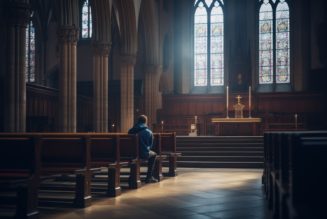
Take a walk with Jesus through your childhood neighborhood this Sunday, in the readings for the 25th Sunday of Ordinary Time, Year B. Be yourself around him, acting just as you always do — too willing to ignore Jesus and too willing to assert your ego.
That is what the Apostles do, and they learn a remarkable insight about spiritual childhood.
This Sunday’s Gospel passage would be funny if it didn’t sting.
It begins with Jesus and the apostles going on “a journey through Galilee, but he did not wish anyone to know about it.”
Last Sunday, Jesus told the Apostles where this journey was headed: He was going to Jerusalem to die, and each would have to “take up his cross and follow me” and be willing to “lose his life for my sake.” Then, a lot happens in the 30 verses we skip between last Sunday’s Gospel and this Sunday’s. First, Mark tells the story of how, with three apostles present, Jesus literally glowed while God himself said “This is my beloved Son. Listen to him!” Meanwhile, other disciples failed to expel a demon from a child and argued with scribes instead, making Jesus complain, “O faithless generation, how long will I endure you?”
So they should have been on high alert and listening when he said, “The Son of Man is to be handed over to men and they will kill him, and three days after his death the Son of Man will rise.” We can imagine what the discussion should have been like:
“Wow. He really means it. He plans to be killed.”
“I know! And he told us we would have to take up our cross and follow.”
“… and lose our lives!”
“What could it mean?”
Those who had seen the Transfiguration might have said, “Clearly, God wants us to listen to him. So let’s listen up!”
And the others could have said, “Absolutely. We need to be less faithless!”
But that’s not what happened. Instead, “they were afraid to question him,” and they spent their time “discussing among themselves on the way who was the greatest.”
This is what we do, often.
Ironically, when we hear this story, we think, “These guys are oafs. I would never argue that I’m the greatest!” — which, if you think about it, amounts to us arguing that we are the greatest, even compared to the Twelve Apostles.
We’re wrong. The truth is, we argue that we are the greatest all the time. Maybe we don’t say “I am the greatest” in so many words, but our clothes, our cars, and our conversations are meant to say that we are a cut above. We tell tales of our encounters with people we feel qualified to ridicule, and make subtle but meaningful references to acquaintances’ shortcomings.
But this story comes after Peter was singled out by Jesus and two additional apostles got special invitations to the Transfiguration — so they were probably arguing about their rank, about who was greatest at following Jesus.
We do that too. God invites us to suffer and serve, but instead we spend our energy justifying our liturgical preferences. We believe that our political stance is the best, our schooling option is the best, the way we dress at Mass is the best way, and so is the way we pray. Others are too disrespectful or too uptight; not us.
We feel free to criticize our pastor, our bishop and even the Pope, since they clearly lack our superior grasp of the faith and the needs of the Church in the 21st century. Yesterday, “dissenter” was the worst thing a Catholic can be; today “pope-splainer” is the worst; tomorrow, “pope-disser” will be the worst, no doubt.
Through it all, our answer to “Who is the greatest Catholic?” is always, “Clearly, one like me.”
There’s a hard way to address this attitude, and an easier way.
The hard way to stop being egotistical is to be persecuted.
If you are like me, you avoid risking even the mild persecution of getting a cold shoulder from friends and family, or of being criticized on Facebook. We do not want co-workers, passing acquaintances, or even complete strangers to think we are too strict on the one hand or too lax on the other.
But in much of the world, the persecution is way worse: Christians are being killed for their faith in the nations of Africa and Asia — and, they are passing this harrowing test. The Church is floundering in the “Who is the greatest?” Church in America, but is growing where persecution is strong.
The First Reading is a description of this kind of persecution, where the non-Christian world says:
“Let us beset the just one, because he is obnoxious to us; he sets himself against our doings, reproaches us for transgressions of the law. … with revilement and torture let us put the just one to the test and try his patience. Let us condemn him to a shameful death.”
This is what Jesus is telling his disciples, and us, to expect, if we will stop arguing with each other and listen.
But there is also an easier way to address our egoism.
To put yourself in the scene, imagine you are walking through the neighborhood you grew up in.
Return to Sunday’s Gospel passage. The Apostles are walking through Galilee, the place where they grew up. When they won’t listen to him, Jesus provides an “object lesson.”
Jesus loves to use visual aids, even using the geographical features that surround him to make his points. In this case, “He placed a child in their midst and taking the child in his arms, he said to them, ‘Whoever receives one child such as this in my name, receives me; and whoever receives me, receives not me but the One who sent me.’”
It’s a very profound lesson.
Try it yourself. In your mind, walk with Jesus by your childhood home, or homes. Around you are all the significant places from your youth: You see the sites of some of your sweetest memories — but you also see the sites of some of your most painful emotional wounds. You see the places where you discovered the goodness and beauty of the world, and gave your heart to those you love. You also see the places you lost your innocence, by your own sins and the sins of others.
You see the place where your worldview changed. In this neighborhood, you started out seeing your parents as perfect, adults as kindly and well-meaning, and the world a place of unlimited possibility. But as you walk along you see the places where you cheated and lied, and the places where you saw things that shocked you, but then came back to look again, and again, and again. This is the place you were misused by people you trusted, betrayed by friends you cared for, and hurt by people who were supposed to protect you.
The place where you grew up is the place you went from feeling confident, strong, and blessed to feeling small, weak and ashamed. And this woundedness is the reason you overcompensate and push your ego forward, trying to justify your place in the world by your own swagger.
Now, imagine Jesus is walking with you. As you have been peering through the windows of your childhood, he has been by your side, though you have been ignoring him.
Then he sits down. The Gospel says he “called the twelve” to him: Picture him calling them by name; picture him calling you by name.
He isn’t angry. He doesn’t criticize you for your boasting and egoism. He understands you and he knows why you behave this way. Instead puts his arm around a child. The Gospel doesn’t even tell us the sex of the child. Think of the child as you, the real you, the you before you lost your wonder and self-confidence. The innocent you who you long to be again.
In Matthew, he says: “Truly, I say to you, unless you turn and become like children, you will never enter the kingdom of heaven.”
Here, he says: “If anyone wishes to be first, he shall be the last of all and the servant of all.”
In other words, you have to be the one who is overlooked and at the mercy of everyone else’s plans, like a child.
We live in the adult world now where “jealousy and selfish ambition exist,” and “there is disorder and every foul practice,” as St. James describes it in the Second Reading. Our aggressive self-assertiveness is responsible for all the evils in the world, he says, including war.
And it all starts with our failure to be “the last” and “the servant of all,” like a child.
St. James describes who we must become: “First of all pure, then peaceable, gentle, compliant, full of mercy and good fruits.”
He is describing how Jesus asks you to be the real you, the childhood you, the you before inconstancy and insincerity, conflicts and covetousness dominated your life.
St. Thérèse of the Child Jesus, whose novena starts this weekend, described how this works. She wrote:
“It is impossible for me to grow bigger, so I put up with myself as I am, with all my countless faults. But I will look for some means of going to heaven by a little way.”
She is like a child, she said:
“It is your arms, Jesus, which are the lift to carry me to heaven. And so there is no need for me to grow up. In fact, just the opposite: I must stay little and become less and less.”
Jesus wants to do the same thing for the childhood you; the real you.
Before you lost your innocence, you faced the world with acceptance, trust, and affection — in other words, with faith, hope and love. You were open and docile — in other words, filled with all the potential of the gifts of the Holy Spirit.
These are exactly the virtues that Jesus gives us each in baptism, renews in confession, and nourishes with the Eucharist.
This Sunday, at communion-time, pray: “I surrender, Lord. You have wrapped your arms around me like a child with your Real Presence. Lift me in your arms and help me become who I was and who I am: Your innocent child.”
Image: Freerange Stock









